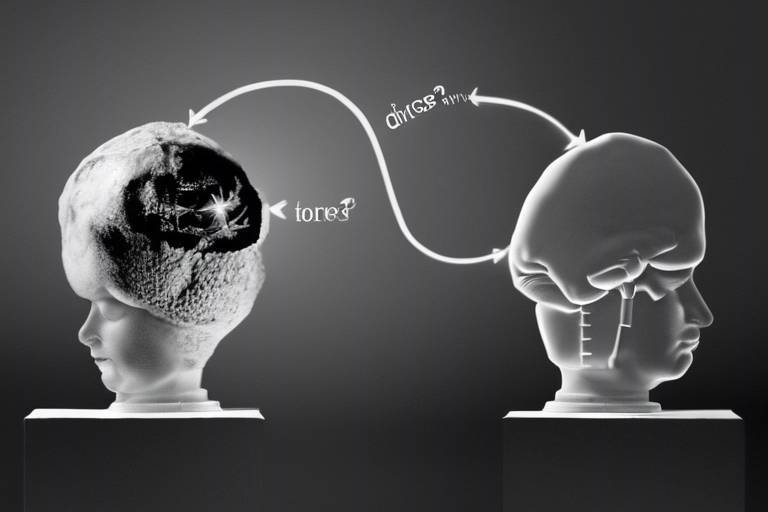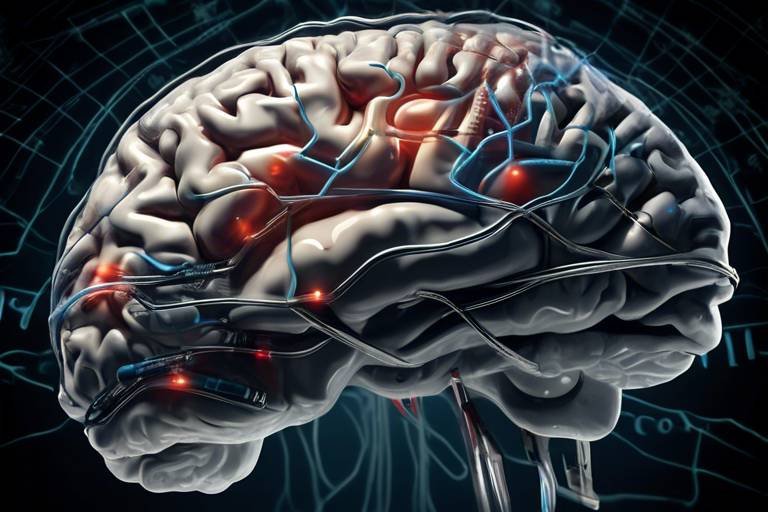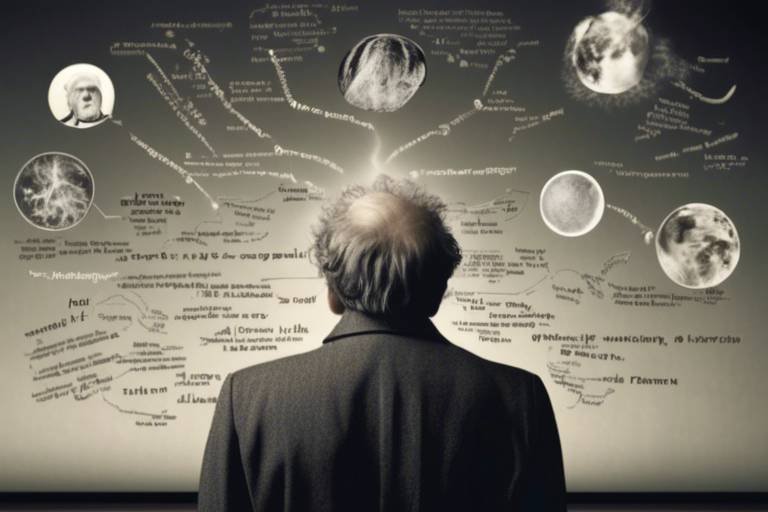The Role of Philosophy in Disease Classification
In the intricate tapestry of healthcare, the classification of diseases is not merely a scientific endeavor; it is deeply intertwined with philosophical concepts that shape our understanding of health and illness. Imagine walking into a doctor's office and being greeted not just by medical jargon, but by a philosophy that influences how your symptoms are interpreted and categorized. This article delves into the profound ways in which philosophy informs disease classification, impacting everything from diagnosis to treatment approaches, and ultimately, the care patients receive.
At its core, philosophy challenges us to question the very essence of what a disease is. Is it merely a collection of symptoms, or does it encompass a broader spectrum of human experience? The implications of these questions ripple through the healthcare system, affecting how diseases are defined and understood. For instance, consider the distinction between a physical ailment and a mental health condition. The philosophical underpinnings of these classifications can lead to vastly different treatment paths and societal perceptions.
Furthermore, the historical evolution of disease classification reveals a fascinating interplay between philosophy and medicine. From ancient times to the modern era, philosophical ideas have continually shaped our understanding of health. Take the ancient Greeks, for example. Their philosophical inquiries laid the groundwork for many medical practices we still use today. It’s as if each era of thought has added a layer to our understanding, building a complex structure that influences how we view disease today.
In exploring these themes, we find that the role of philosophy in disease classification is not just about academic discourse; it has real-world implications. It challenges healthcare professionals to consider not just the physical aspects of disease but also the emotional and psychological dimensions. This holistic view encourages a more compassionate approach to patient care, reminding us that behind every diagnosis is a human being with a unique story.
As we navigate this intricate landscape, it becomes clear that philosophy is not just an abstract concept; it is a vital component of how we classify diseases and, by extension, how we treat patients. In the following sections, we will explore specific philosophical influences on disease classification, ethical considerations, and future directions, revealing the profound impact of philosophical thought on the medical field.
- How does philosophy influence medical practice?
Philosophy shapes the definitions and classifications of diseases, which directly impacts diagnosis and treatment approaches. - What are some historical philosophical influences on medicine?
Ancient philosophers like Hippocrates and Galen emphasized observation and rationality, laying foundational concepts for modern medicine. - Why is ethics important in disease classification?
Ethical considerations guide the moral implications of disease classification, affecting treatment access, stigma, and patient rights. - What future challenges might arise in disease classification?
The intersection of philosophy and emerging medical technologies may prompt reevaluation of existing frameworks and ethical dilemmas.

Understanding Disease Concepts
When we dive into the world of medicine, the term disease often feels like a straightforward label we apply to various health conditions. But what does it really mean? Philosophy plays a pivotal role in shaping our understanding of disease concepts, influencing not just how we define diseases but also how we approach diagnosis and treatment. Think of it like a pair of glasses that helps us see the complexities hidden beneath the surface of a simple label.
At its core, the philosophical inquiry into disease prompts us to ask, What qualifies something as a disease? Is it merely a deviation from the norm, or does it require a deeper understanding of human experience? This exploration leads us to various frameworks that help categorize diseases. For instance, some philosophers argue that diseases should be seen through a biological lens, focusing on physiological abnormalities. Others advocate for a more holistic approach, considering psychological, social, and even environmental factors. This diversity of thought reflects the multifaceted nature of health and illness.
Moreover, the implications of these philosophical frameworks are profound. They not only guide medical professionals in their clinical practices but also shape public health policies and influence how society perceives individuals living with diseases. For example, the classification of mental health conditions has evolved significantly over the years, thanks in part to philosophical discussions surrounding the nature of mental illness. In the past, many mental health issues were stigmatized, often viewed through a moral lens. Today, however, there is a growing recognition of the need for compassion and understanding, largely driven by philosophical reflections on human dignity and rights.
To illustrate this further, consider the following table, which outlines different philosophical perspectives on disease classification:
| Philosophical Perspective | Key Focus | Implications for Disease Classification |
|---|---|---|
| Biological Reductionism | Physical and biological abnormalities | Emphasis on physiological metrics for diagnosis |
| Holistic Approach | Integration of physical, mental, and social factors | Broader definitions that include psychological and social dimensions |
| Phenomenology | Personal experiences of illness | Focus on how individuals perceive and experience their diseases |
As we continue to explore these philosophical underpinnings, it becomes increasingly clear that the way we classify diseases can either empower patients or perpetuate stigma. The evolution of disease concepts, influenced by philosophical thought, invites us to reconsider not only our definitions but also our approaches to treatment and care.
Ultimately, understanding disease concepts through a philosophical lens enriches our comprehension of health and illness. It encourages us to engage in a dialogue that transcends mere labels, prompting us to ask deeper questions about the human experience of disease and the ethical responsibilities that come with it. So, the next time you hear the word disease, take a moment to reflect on the intricate web of ideas that shape its meaning.
- What is the role of philosophy in medicine? Philosophy helps shape our understanding of diseases, guiding definitions, classifications, and treatment approaches.
- How do philosophical concepts influence patient care? They affect how we perceive illnesses, leading to more compassionate care and reducing stigma.
- Can philosophy change the way diseases are classified? Yes, philosophical discussions can prompt reevaluations of existing frameworks, leading to more inclusive classifications.

Historical Perspectives
The history of disease classification is a fascinating journey, intertwining the threads of philosophical thought and medical practice. From the ancient civilizations that first attempted to understand the human body to modern-day classifications that rely heavily on technology and research, the evolution of how we perceive and categorize diseases reflects broader societal beliefs and values. In ancient times, diseases were often seen as punishments from the gods or as manifestations of moral failings. This perspective shaped the early medical practices, where healing was as much about spiritual well-being as it was about physical health.
As we delve deeper into history, we encounter influential figures like Hippocrates and Galen, who laid the groundwork for a more systematic approach to medicine. Hippocrates, often called the "Father of Medicine," emphasized observation and clinical practice, advocating for a naturalistic understanding of diseases. His work marked a significant shift from supernatural explanations to more empirical methods. Galen built upon these ideas, introducing concepts of anatomy and physiology that became foundational for future medical classifications. Together, they championed the idea that diseases could be understood through careful observation and rational thought, a notion that remains vital in modern medicine.
Another significant philosophical influence came from Aristotle, whose logical frameworks provided a systematic approach to categorizing diseases. His insistence on empirical evidence helped establish a more structured methodology in medicine, paving the way for the classification systems we use today. Aristotle's impact is particularly evident in how we categorize diseases based on their characteristics and symptoms, allowing for a more coherent understanding of health and illness.
Moreover, the Stoics introduced a different perspective on health, emphasizing the importance of mental resilience and emotional well-being. They argued that true health transcends mere physical existence, incorporating psychological dimensions that are often overlooked in traditional medical paradigms. This holistic view of health encourages us to consider not just the physical symptoms of a disease but also the mental and emotional states of individuals, enriching our understanding of what it means to be healthy.
As we move into the modern era, the classification of diseases has continued to evolve, influenced by philosophical discussions surrounding identity, ethics, and social constructs. The advent of technologies like genetic testing and imaging has transformed how we classify diseases, but it has also raised new ethical dilemmas. For instance, how do we classify diseases that are not easily observable or that exist on a spectrum? These questions challenge us to rethink our existing frameworks and consider the implications of our classifications on patient care and societal perceptions of health.
In summary, the historical perspectives on disease classification reveal a rich tapestry woven from philosophical ideas and medical practices. Each era has contributed to our current understanding, highlighting the importance of not just the diseases themselves but also the underlying beliefs that shape our approach to health and illness.
- How has philosophy influenced modern medicine?
Philosophy has provided foundational concepts that guide medical ethics, disease classification, and the understanding of health, shaping how practitioners approach diagnosis and treatment.
- What role did ancient philosophers play in disease classification?
Ancient philosophers like Hippocrates and Galen emphasized observation and naturalistic explanations for diseases, laying the groundwork for systematic medical practices.
- Why is the classification of diseases important?
Accurate disease classification is crucial for effective diagnosis, treatment, and understanding of health conditions, influencing patient care and healthcare policies.

Classical Philosophical Influences
When we delve into the roots of medical philosophy, we encounter ancient thinkers like Hippocrates and Galen, who laid the groundwork for how we perceive and classify diseases today. Their contributions were not merely academic; they were revolutionary, reshaping the landscape of medicine by emphasizing observation and rationality. Imagine a time when illness was often attributed to supernatural forces or imbalances in bodily humors. These early philosophers challenged such notions, advocating for a more systematic approach to understanding health and disease.
Hippocrates, often referred to as the "Father of Medicine," introduced the idea that diseases could be studied and understood through careful observation of patients and their symptoms. He believed that the body had its own healing mechanisms and that the physician's role was to facilitate this process rather than impose their will. This perspective was a significant shift from previous beliefs and laid the foundation for a more empirical approach to medicine. His famous Hippocratic Corpus contains numerous texts that detail clinical observations, emphasizing the importance of prognosis and the natural course of diseases.
On the other hand, Galen expanded upon Hippocratic ideas and introduced a more complex understanding of anatomy and physiology. He performed dissections on animals to gain insights into human anatomy, a practice that was both controversial and groundbreaking at the time. Galen's work emphasized the importance of empirical evidence and led to a more structured classification of diseases based on observable symptoms and anatomical knowledge. His influence was so profound that it shaped medical thought for centuries, with his texts serving as authoritative references in both the Islamic world and medieval Europe.
To illustrate the impact of these classical philosophers on modern medicine, consider the following table that outlines their key contributions:
| Philosopher | Key Contributions |
|---|---|
| Hippocrates |
|
| Galen |
|
Moreover, the philosophical underpinnings of these classical influences extend beyond mere classification. They instilled a sense of responsibility in physicians to not only treat the body but also to consider the holistic well-being of the patient. This idea resonates with modern practices that advocate for a comprehensive approach to healthcare, where mental and emotional health are just as important as physical conditions. The seeds sown by Hippocrates and Galen continue to flourish in contemporary medicine, reminding us that the philosophical roots of disease classification are deeply intertwined with ethical considerations and patient care.

Aristotelian Logic in Medicine
Aristotelian logic has had a profound impact on the field of medicine, particularly in the way diseases are classified and understood. Aristotle emphasized the importance of systematic observation and rational deduction, laying the groundwork for a methodical approach to medical science. His belief in categorizing knowledge into distinct domains has influenced how we categorize diseases today. For instance, when medical practitioners diagnose a patient, they often rely on a logical framework that involves observing symptoms, gathering patient history, and deducing the most likely condition based on established classifications.
One of the key contributions of Aristotelian logic to medicine is the concept of empirical evidence. Aristotle argued that knowledge should be grounded in observable phenomena. This idea resonates in modern medicine, where clinicians are trained to rely on evidence-based practices. Let's consider how this framework can be applied in a clinical setting:
| Step | Description |
|---|---|
| 1 | Observation: Gathering data on the patient's symptoms and medical history. |
| 2 | Classification: Using established categories to classify the symptoms (e.g., infectious, autoimmune). |
| 3 | Diagnosis: Formulating a diagnosis based on the evidence collected and the logical deductions made. |
| 4 | Treatment: Developing a treatment plan that aligns with the diagnosis and empirical evidence. |
This logical approach not only enhances the accuracy of diagnoses but also fosters a deeper understanding of the underlying mechanisms of diseases. For example, by categorizing diseases into different types, such as infectious versus non-infectious, healthcare providers can tailor their treatment strategies more effectively. This methodical classification allows for a more nuanced understanding of diseases, which is crucial for effective patient care.
Moreover, Aristotelian logic encourages medical professionals to question and refine existing classifications continually. As new diseases emerge and our understanding of health evolves, the need for a flexible yet structured approach becomes evident. This adaptability is essential in a world where medical knowledge is constantly expanding. In essence, the principles of Aristotelian logic not only provide a foundation for disease classification but also promote an ongoing dialogue about the nature of health and illness.
In conclusion, the influence of Aristotelian logic in medicine cannot be overstated. It serves as a guiding principle that shapes how diseases are classified, diagnosed, and treated. By marrying observation with rational thought, medical practitioners are better equipped to navigate the complexities of human health, ultimately leading to improved patient outcomes.
- What is Aristotelian logic? Aristotelian logic is a framework developed by the philosopher Aristotle that emphasizes systematic observation and rational deduction.
- How does Aristotelian logic influence modern medicine? It influences modern medicine by providing a structured approach to disease classification, diagnosis, and treatment based on empirical evidence.
- Why is empirical evidence important in medicine? Empirical evidence is crucial as it ensures that medical practices are grounded in observable phenomena, leading to more accurate diagnoses and effective treatments.
- Can Aristotelian logic adapt to new medical discoveries? Yes, Aristotelian logic encourages continuous questioning and refinement of existing classifications, allowing for adaptability in response to new medical knowledge.

Stoicism and Health
Stoicism, an ancient Greek philosophy, offers profound insights into the nature of health and disease, emphasizing the importance of mental resilience and emotional well-being. At its core, Stoicism teaches that while we cannot control external events, we can control our reactions to them. This perspective is particularly relevant when considering health issues, as it encourages individuals to cultivate a sense of inner peace and strength, regardless of their physical circumstances. Imagine facing a chronic illness; instead of succumbing to despair, a Stoic approach would empower you to focus on what you can control: your attitude, your responses, and your capacity to find meaning in suffering.
One of the key tenets of Stoicism is the idea of virtue as the highest good. Virtue, in this context, refers to qualities such as wisdom, courage, and justice. When applied to health, this philosophy suggests that maintaining a virtuous life can lead to better mental and physical health outcomes. For instance, practicing virtues like courage can help individuals face health challenges with bravery, while wisdom can guide them in making informed decisions about their treatment options. This holistic view of health encompasses not just the absence of disease, but the presence of a fulfilled and meaningful life.
Furthermore, Stoicism encourages the practice of mindfulness and self-reflection, which can be incredibly beneficial for those grappling with health issues. By regularly assessing one's thoughts and emotions, individuals can identify negative patterns that may exacerbate their conditions. For example, individuals can ask themselves questions like:
- Am I allowing fear to dictate my actions regarding my health?
- How can I reframe my perspective on this illness to focus on personal growth?
- What aspects of my health can I influence through my choices and mindset?
This self-inquiry not only fosters a more resilient mindset but also promotes a deeper understanding of the relationship between mental and physical health. The Stoic practice of negative visualization—imagining the worst-case scenarios—can also prepare individuals for potential health setbacks, reducing the shock and emotional turmoil when facing reality. By contemplating loss or illness, one can develop a greater appreciation for health and cultivate gratitude for the present moment.
Moreover, Stoicism underscores the importance of community and social connections in maintaining health. The Stoics believed in the concept of cosmopolitanism, which emphasizes that all humans are part of a larger community. This notion encourages individuals to seek support from others, whether through family, friends, or support groups, especially during challenging health journeys. Engaging with others not only provides emotional support but also fosters a sense of belonging and shared experience, which can be incredibly healing.
In summary, Stoicism offers a rich framework for understanding health that transcends mere physicality. By cultivating resilience, practicing mindfulness, and embracing community, individuals can navigate health challenges with a sense of purpose and strength. The Stoic approach reminds us that while we may not have control over our physical circumstances, we have the power to shape our responses, ultimately leading to a more fulfilling life despite the challenges we may face.
- What is Stoicism? Stoicism is an ancient Greek philosophy that teaches the development of self-control and fortitude as a means to overcome destructive emotions.
- How can Stoicism help with health issues? Stoicism encourages resilience, mindfulness, and a positive mindset, which can help individuals cope better with health challenges.
- Is Stoicism relevant today? Absolutely! Many people find Stoic principles applicable in modern life, especially in managing stress and improving mental health.
- Can Stoicism improve mental health? Yes, by promoting emotional regulation and a focus on what can be controlled, Stoicism can enhance mental well-being.

Modern Philosophical Approaches
In today's rapidly evolving healthcare landscape, the role of philosophy in disease classification has taken on new dimensions. Modern philosophical approaches delve into the intricate relationship between disease, identity, and societal values. This exploration is not just an academic exercise; it has real-world implications for how we understand health and illness. For instance, consider how the classification of diseases can influence the way individuals perceive themselves and their place in society. It raises questions such as: What does it mean to be labeled with a particular disease? How does this label affect a person's identity and self-worth?
One of the most significant contributions of contemporary philosophy is the examination of the social constructs surrounding health and illness. Philosophers argue that diseases are not merely biological phenomena; they are also shaped by cultural, social, and ethical dimensions. This perspective invites us to rethink traditional classifications and consider the broader implications of labeling someone with a specific condition. For example, the classification of mental health disorders has evolved considerably, with a growing recognition of the importance of context and individual experience.
Moreover, modern philosophical discussions often intersect with issues of ethics and justice in healthcare. The way diseases are classified can lead to disparities in treatment access and the stigmatization of certain conditions. This is especially evident in the case of chronic illnesses and mental health issues, where societal perceptions can significantly impact an individual's experience of their condition. Philosophers argue that a more nuanced understanding of disease classification is essential for promoting equity in healthcare. By acknowledging the social dimensions of health, we can work towards a more inclusive and compassionate medical practice.
In addition, the advent of advanced medical technologies has prompted a reevaluation of existing disease classification frameworks. As we embrace innovations such as genetic testing and personalized medicine, philosophical inquiries into the implications of these technologies become increasingly relevant. For instance, how do we classify diseases when the boundaries between health and illness blur due to genetic predispositions? What ethical considerations arise when we have the ability to predict and modify health outcomes based on genetic information?
Ultimately, modern philosophical approaches challenge us to think critically about the definitions and classifications of diseases. They encourage a dialogue that goes beyond the biological aspects of illness, urging us to consider the ethical, social, and personal implications of how we categorize health conditions. As we continue to navigate the complexities of disease classification, integrating philosophical insights can lead to more humane and just healthcare practices.
- What is the importance of philosophy in disease classification?
Philosophy helps to frame our understanding of what constitutes a disease, influencing definitions that affect diagnosis and treatment approaches. - How have historical perspectives shaped modern disease classification?
Historical philosophical ideas have laid the groundwork for current medical practices, affecting societal perceptions of health and illness. - What ethical concerns arise from disease classification?
Ethical issues include stigmatization, access to treatment, and the rights of patients, all of which are influenced by how diseases are classified. - How do modern technologies impact disease classification?
Emerging technologies challenge traditional frameworks, prompting discussions about the ethical implications of genetic testing and personalized medicine.

Ethics in Disease Classification
The classification of diseases is not merely a scientific endeavor; it is deeply intertwined with ethical considerations that can have profound implications for patient care and societal attitudes. When we think about how diseases are categorized, we must ask ourselves: what criteria are we using, and who gets to decide? These questions are crucial because they can shape not only medical treatment but also how individuals are perceived in society. For instance, the classification of mental health disorders versus physical ailments often leads to differing levels of stigma and support, raising ethical dilemmas about fairness and equity in healthcare.
One of the most pressing ethical concerns in disease classification is the potential for stigmatization. Certain diseases, particularly those associated with mental health or lifestyle choices, can lead to social discrimination. Patients may experience judgment or exclusion from their communities, which can exacerbate their conditions. This raises a moral imperative for healthcare providers to be vigilant about the language and frameworks they use in classification. By fostering a more inclusive and compassionate approach, we can mitigate the negative social impact of disease labels.
Furthermore, the principles of justice and equity are central to ethical discussions surrounding disease classification. It's essential to ensure that classification systems do not inadvertently favor certain groups over others. For example, if a disease is classified in a way that predominantly affects marginalized communities, it could lead to inadequate research funding and limited access to treatment options. This inequity can perpetuate cycles of disadvantage, making it imperative for policymakers and healthcare professionals to consider the broader implications of their classification decisions.
To illustrate the impact of ethical considerations in disease classification, consider the following table:
| Disease Classification | Potential Ethical Issues | Impact on Patients |
|---|---|---|
| Mental Health Disorders | Stigmatization, Misunderstanding | Social isolation, Reduced access to care |
| Chronic Illnesses | Resource allocation, Inequity | Limited treatment options, Financial burden |
| Infectious Diseases | Public fear, Discrimination | Quarantine, Social ostracism |
As we navigate the complexities of disease classification, it's vital to engage in ongoing philosophical discourse about the ethical implications of our choices. This involves not only healthcare professionals but also patients, families, and society at large. By fostering an inclusive dialogue, we can work towards a more equitable healthcare system that respects the dignity of all individuals, regardless of their health status.
In conclusion, the ethics of disease classification is a multifaceted issue that demands careful consideration. As we strive for a healthcare system that is just and equitable, we must remain vigilant about the language we use and the frameworks we adopt. Ultimately, the goal should be to create a system that not only accurately classifies diseases but also promotes understanding, compassion, and equitable access to care for all.
- What is the impact of disease classification on patient care? Disease classification influences treatment options, access to care, and societal perceptions of patients, which can affect their mental and physical health.
- How can stigma be reduced in disease classification? By using inclusive language and fostering understanding, healthcare providers can help mitigate the negative effects of stigma associated with certain diseases.
- Why is equity important in disease classification? Ensuring that all individuals have equal access to healthcare resources and treatment options is crucial for a fair and just healthcare system.

Stigmatization of Diseases
The classification of certain diseases often leads to a phenomenon known as stigmatization, which can have profound implications for individuals and society at large. When a disease is labeled in a way that carries negative connotations, it can result in individuals feeling isolated, judged, or even discriminated against. This stigma can stem from various sources, including cultural beliefs, media portrayals, and historical contexts. For instance, diseases like HIV/AIDS and mental health disorders have been heavily stigmatized, creating barriers to treatment and support. But why does this happen? It's essential to understand that stigma is not just about the disease itself; it's about how society perceives and reacts to it.
One of the key issues with stigmatization is that it often leads to discrimination. Individuals suffering from stigmatized diseases may face challenges in accessing healthcare, finding employment, or even maintaining relationships. This discrimination can manifest in various ways, such as:
- Social Isolation: People may withdraw from social interactions to avoid judgment.
- Employment Challenges: Employers may be reluctant to hire someone with a stigmatized condition.
- Healthcare Access: Stigmatized individuals might avoid seeking medical help due to fear of being judged.
Moreover, the implications of stigmatization extend beyond individual experiences. It can also shape public health policies and healthcare practices. When diseases are stigmatized, there is often less funding allocated for research and treatment, which perpetuates a cycle of misunderstanding and neglect. This is particularly concerning in the case of emerging diseases or conditions that are not well understood. As healthcare providers, it's crucial to recognize the ethical responsibility to combat stigma and promote understanding.
Addressing the stigmatization of diseases requires a multifaceted approach that includes education, awareness campaigns, and policy changes. By fostering an environment of empathy and understanding, we can work towards dismantling the negative stereotypes associated with certain conditions. For instance, public health initiatives that focus on destigmatizing mental health issues have shown promising results in improving access to care and support.
In conclusion, the stigmatization of diseases is a complex issue that intertwines with philosophical ethics, societal perceptions, and healthcare practices. By acknowledging the impact of stigma, we can begin to take meaningful steps toward creating a more inclusive and equitable healthcare system for all individuals, regardless of their health conditions.
- What is disease stigmatization? Disease stigmatization refers to the negative attitudes and beliefs that society holds about individuals with certain health conditions, leading to discrimination and social isolation.
- How can we combat disease stigma? Combating disease stigma requires education, awareness, and open conversations to foster empathy and understanding in society.
- What are the consequences of disease stigmatization? Consequences include discrimination in healthcare, employment challenges, and increased social isolation for those affected by stigmatized diseases.

Equity in Healthcare
Equity in healthcare is a concept that resonates deeply within the realms of philosophy and ethics. It emphasizes the necessity for all individuals to have fair access to medical services, regardless of their background, socioeconomic status, or health conditions. Imagine a world where healthcare is as accessible as your favorite coffee shop—where everyone can walk in and receive the care they need without barriers. Unfortunately, this is not the reality for many people today. Philosophical discussions around equity challenge us to consider the moral implications of healthcare disparities and the responsibilities of society to rectify them.
At the heart of this issue lies the concept of justice. Philosophers like John Rawls have argued for a system where the least advantaged members of society are prioritized. In the context of healthcare, this means that those who are most vulnerable should receive the most attention and resources. This perspective encourages us to look at healthcare not just as a service, but as a fundamental human right. When we classify diseases, we must also consider how these classifications can affect access to care. For instance, certain conditions may be stigmatized, leading to further marginalization of affected individuals. This creates a cycle of inequity that is difficult to break.
To illustrate this point, consider the following table that highlights disparities in healthcare access based on various factors:
| Factor | Impact on Healthcare Access |
|---|---|
| Socioeconomic Status | Lower income individuals often face barriers such as lack of insurance, transportation issues, and limited availability of services. |
| Geographic Location | Rural areas may lack specialized medical facilities, forcing residents to travel long distances for care. |
| Race and Ethnicity | Minority groups may experience discrimination in healthcare settings, leading to poorer health outcomes. |
| Gender | Women and LGBTQ+ individuals might face unique challenges, including bias in treatment and lack of tailored services. |
This table underscores the multifaceted nature of healthcare equity. It is not merely about providing care; it is about ensuring that care is accessible to everyone, irrespective of their circumstances. The philosophical inquiry into healthcare equity also raises questions about the role of healthcare providers. Are they merely service providers, or do they have a moral obligation to advocate for their patients' rights? This is where the intersection of ethics and philosophy becomes crucial. Healthcare professionals must navigate these complex waters, balancing their duty to provide care with the need to address broader societal issues.
Furthermore, the discussions surrounding equity in healthcare are increasingly relevant in the face of emerging medical technologies. As innovations in medicine continue to evolve, we must ask ourselves: Are these advancements accessible to all? Or do they risk widening the gap between different populations? The philosophical implications of these questions are profound, as they challenge us to rethink our current systems and the values that underpin them. Ultimately, achieving equity in healthcare requires a collective effort, one that is informed by philosophical principles and driven by a commitment to justice.
- What is the difference between equality and equity in healthcare?
Equality means providing the same resources to everyone, while equity involves giving people what they need to achieve similar health outcomes. - Why is equity in healthcare important?
Equity ensures that all individuals have access to necessary medical services, which is crucial for improving overall public health and reducing health disparities. - How can healthcare providers promote equity?
Providers can promote equity by advocating for policies that address social determinants of health and by ensuring that their services are accessible to all communities.

Future Directions in Disease Classification
As we venture further into the 21st century, the landscape of disease classification is undergoing a transformation fueled by rapid advancements in technology and a deeper understanding of human biology. The integration of artificial intelligence (AI) and machine learning into medical practice is revolutionizing how we diagnose and categorize diseases. Imagine a world where algorithms analyze vast datasets to identify patterns that even the most skilled doctors might overlook. This isn't science fiction; it's happening now, and it opens up exciting possibilities for the future of healthcare.
Moreover, the growing emphasis on personalized medicine is reshaping our approach to disease classification. Instead of relying solely on traditional categories, healthcare providers are beginning to consider genetic, environmental, and lifestyle factors that contribute to an individual's health. This holistic view encourages a more nuanced understanding of diseases, moving beyond the binary classifications that have dominated medical practice for centuries.
However, with these advancements come significant ethical considerations. For instance, as we develop more sophisticated classification systems, we must ask ourselves: Are we inadvertently creating new forms of stigma? The classification of mental health disorders, for example, has evolved over time, but it still carries societal weight that can lead to discrimination. As we refine our understanding of diseases, we must also ensure that we are sensitive to the implications of these classifications on people's lives.
Additionally, the intersection of philosophy and technology prompts us to reevaluate existing frameworks. Questions arise about the criteria we use to define diseases and the potential biases inherent in these systems. Are we prioritizing certain populations over others? Are we considering cultural perspectives on health and illness? These inquiries are crucial as we strive for equity in healthcare access and treatment.
To navigate this evolving landscape, interdisciplinary collaboration will be essential. Medical professionals, ethicists, data scientists, and philosophers must work together to create classification systems that are not only scientifically sound but also ethically responsible. Such collaboration can help us establish guidelines that prioritize patient rights and dignity while embracing the potential of emerging technologies.
In conclusion, the future of disease classification is bright yet complex. As we harness the power of technology and deepen our philosophical inquiries, we must remain vigilant in addressing the ethical dilemmas that arise. By doing so, we can create a healthcare system that is not only efficient and effective but also compassionate and just.
- What is the impact of AI on disease classification?
AI can analyze large datasets to identify patterns, helping to improve diagnostic accuracy and create more tailored treatment plans. - How does personalized medicine change disease classification?
Personalized medicine considers genetic and lifestyle factors, leading to a more individualized approach to understanding diseases. - What ethical concerns arise with new classification systems?
New classifications may inadvertently create stigma or biases, requiring careful consideration of their social implications.
Frequently Asked Questions
- What is the role of philosophy in understanding diseases?
Philosophy plays a crucial role in shaping our understanding of diseases by providing frameworks that influence definitions and classifications. These philosophical concepts impact how healthcare professionals diagnose and treat patients, ultimately affecting patient care and health outcomes.
- How have historical perspectives influenced disease classification?
Historical perspectives reveal that philosophical ideas have significantly shaped medical practices over time. For instance, ancient philosophers like Hippocrates and Galen emphasized observation and rationality, which laid the groundwork for modern approaches to disease classification and understanding health.
- What are the implications of stigmatization in disease classification?
Stigmatization can lead to discrimination against individuals with certain diseases, raising ethical concerns about how these classifications affect patient rights and access to care. It's essential for healthcare providers to recognize and address these issues to promote a more equitable healthcare environment.
- How does modern philosophy address the ethics of disease classification?
Modern philosophy encourages discussions on the moral implications of disease classification, focusing on issues like justice and equity in healthcare. It challenges us to ensure that classification systems do not perpetuate inequalities, advocating for fair access to treatment for all individuals.
- What future directions might philosophy and medicine take together?
The intersection of philosophy and emerging medical technologies prompts a reevaluation of existing disease classification frameworks. This collaboration invites new ethical considerations that could reshape how we understand and categorize diseases in the future, ensuring that patient care evolves alongside technological advancements.



















